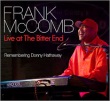We've seen it dozens of times: Artists who bristle when being compared to greats of past years, even when the vocal or stylistic similarities are obvious to even casual music listeners. But that has never been Frank McComb. From the moment soul music fans first heard him, either as part of the group Buckshot LeFonque or when he released his solo debut album, Love Stories, the similarity of his voice to that of legendary singer Donny Hathaway was striking. It's not that his style mimicked that of Hathaway. McComb, while also a piano-playing, songwriting baritone, came out of the box with a style more jazz-influenced and more improvisational that Hathaway's. But the questions were nonetheless asked of him again and again, and I always admired the way McComb responded: He saw the comparison not as a threat to his own artistry, but rather as a compliment as to the level of accomplishment of his work.
We've seen it dozens of times: Artists who bristle when being compared to greats of past years, even when the vocal or stylistic similarities are obvious to even casual music listeners. But that has never been Frank McComb. From the moment soul music fans first heard him, either as part of the group Buckshot LeFonque or when he released his solo debut album, Love Stories, the similarity of his voice to that of legendary singer Donny Hathaway was striking. It's not that his style mimicked that of Hathaway. McComb, while also a piano-playing, songwriting baritone, came out of the box with a style more jazz-influenced and more improvisational that Hathaway's. But the questions were nonetheless asked of him again and again, and I always admired the way McComb responded: He saw the comparison not as a threat to his own artistry, but rather as a compliment as to the level of accomplishment of his work. It takes an artist who is comfortable in his own musical skin to not only accept repeated comparisons, but to embrace them. And McComb gives the ultimate hug to Hathaway's legacy with his newest release, Live at the Bitter End: Remembering Donny Hathaway.
For an artist who only released three solo studio albums, Donny Hathaway has cast an unusually large shadow over an entire generation of soul music performers. With an almost singular gravitas as a soul music songwriter and vocal interpreter, he has become the kind of artist whose name is often uttered in hushed tones. Maybe it is for that reason that recorded tributes to him have been surprisingly few. But with Live at the Bitter End (which was supported by a November, 2013 Kickstarter campaign), McComb not only takes the legacy head on, he does it at the location of Hathaway's legendary 1971 concert recording.
The disc opens with an introduction by ubiquitious New York soul music host, Jodine Dorce, and leads into a largely acoustic, intimate set of familiar songs, beginning with "Love, Love, Love." This cut, originally recorded by Hathaway on his Extension of a Man album, sets the template for McComb's approach throughout the album: Vocally, he sounds like Hathaway's long lost son, but musically he avoids being too reverential to the original versions; reinterpreting, improvising and adding runs to take the songs from the familiar to the unknown and back again - all with just a piano and his voice. So, while the recognizeable first bars of "Someday We'll All Be Free" provide the chills of the Hathaway original, McComb detours into dramatic musical interludes that give new life to lyrics that spoke volumes a generation ago. The same can be said for "Flying Easy, "You Were Meant for Me" and the medley "A Song For You / For All We Know," each starting in a familiar fashion before moving through musical diversions that provide both immediacy and uniqueness to the live performance.
Amid the set of covers is an unexpected gem: McComb wrote a tribute song for Hathaway in the early 90s that was never released, but "We'll Carry Your Name On" becomes a surprise highlight of Bitter End; it's a song that serves as a homage to Hathaway's serious legacy while also touching lighter career references like "This Christmas" and even the theme song from the 70s television show, Maude.
At a time when we've grown annoyed with the volume of "covers" albums hitting the market - tired attempts to capitalize on the popularity of the classic songs of Detroit or Philadelphia - once in awhile an album of reinterpreted material arrives that provides a different look and actually helps us to again appreciate the underlying compositions and the original artists who made them. Live at the Bitter End is just that kind of album, a loving tribute made by the right artist at the right location. Best of all, Bitter End removes those overly reverential, church-like hushed tones that have been cast over Hathaway and his music since his death 35 years ago, and instead allows the true, living legacy of the songs, the musicianship and even the fun to scream, full-voiced, all over again. Highly Recommended.
By Chris Rizik

